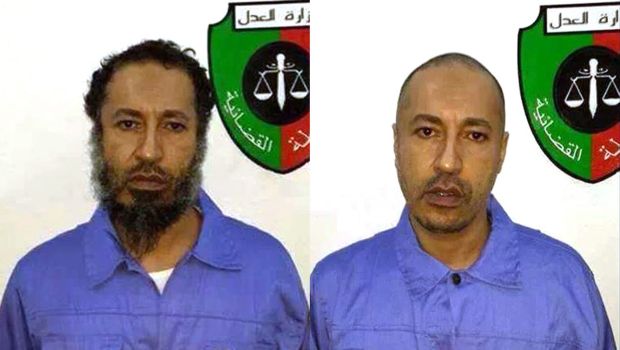
Photos released on 06 March 2014 by Libyan Prison Authority showing Saadi Gaddafi before and after having his hair shaved at a prison in Tripoli, Libya. (EPA/LIBYAN PRISON AUTHORITY/HANDOUT)
The authorities said Saadi—one of the deposed Libyan leader’s eight children—will be treated “in accordance with international law.”
A Libyan official, who spoke on condition of anonymity in line with regulations, said Saadi arrived in the early hours on Thursday at the Tripoli airport and was transferred to a prison in the capital.
Shortly after the news broke, photographs circulated on social media showing Saadi in a blue prison uniform while Libyan guards were shaving his hair and beard.
Saadi was known for his love of professional soccer and a playboy lifestyle. His brief career in Italian football ended after a failed drug test. He headed Libya’s Football Federation and was also the former head of the country’s special forces.
Like most of Gaddafi loyalists and ex-regime officials, Saadi is wanted for his role in curbing protests against his father’s rule and the killing of protesters.
But unlike his brother, Saif Al-Islam, who was groomed to be Gadhafi’s successor, Saadi is not sought by the International Criminal Court. Saif Al-Islam is held by a militia in the western Libyan town of Zintan, which refuses to hand him over to the central government for trial.
With Thursday’s extradition, Saadi joins Saif Al-Islam as the only two of Gaddafi’s children currently in Libya. At least three other Gaddafi’s sons were killed during the uprising while the rest of the children sought asylum in neighboring Algeria, along with Gaddafi’s wife and Saadi’s mother, Safiya. The mother, a sister and two brothers, were granted asylum in Oman in 2012 and moved there from Algeria.
Niger had previously refused to comply with Libyan requests for Saadi, saying that once he was back home, he might be killed.
There have been tensions between the two African nations and while Libya has criticized the presence of Gaddafi loyalists in Niger, Niger has expressed concern about “the terrorist threat” posed by the lack of security in southern Libya, near its own border.
The elder Gaddafi ruled Libya with an eccentric brutality for nearly 42 years before he was ousted by an uprising in August 2011. He was captured and killed in October, along with his son Mutassim. Killed earlier in the civil war were younger brothers Saif Al-Arab and Khamis.
The rule of law is still weak in Libya after decades of Gadhafi’s reign. Courts are still paralyzed and security remains tenuous as unruly militias proliferate.
The state, however, relies heavily on the militias to serve as security forces since the police and military remain a shambles. Successive governments have been too weak to either secure Saif Al-Islam’s imprisonment in the capital or put pressure on the Zintan militia to hand him over to the government.
The ICC has charged Saif Al-Islam with murder and persecution of civilians during the early days of the Libyan uprising. If convicted in that court, he would have faced a maximum sentence of life imprisonment, because it does not have the death penalty.
Last summer, the international court judges ruled that Libya cannot give Saif Al-Islam a fair trial and asked authorities to hand him over to The Hague.
